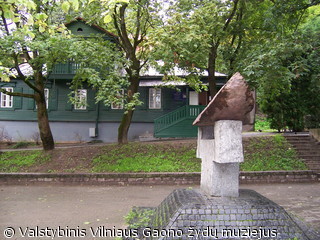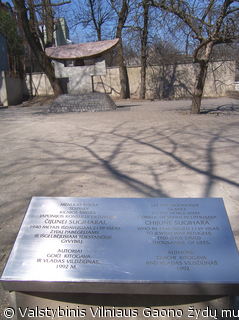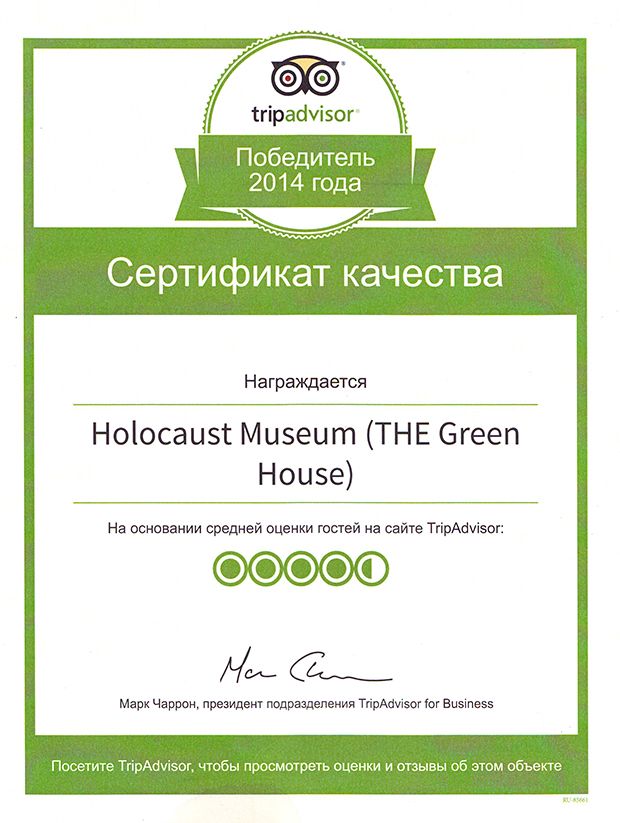| | Holocaust exhibition (The Green House) |
| Information for visitors |
| Excerpts of a guided tour with Rachel Kostanian you can find here |
|
The Holocaust Exhibition tells of the culture and history of a once prolific Lithuanian ethnic minority, it tells the story of the Jews from their arrival in the Grand Duchy of Lithuania till their tragic death in the 20th century. "Litvak civilization" is a vanished world that bears witness to the city of Vilnius's role once as the Jerusalem of Lithuania, while Litvaks lived in almost every village, town and city. This nation who gave Lithuania and the world the landscape painter Isaak Levitan, the violinist Yasha Heifetz, the artist Chaim Soutine, the sculptor Jacques Lipschitz, the podiatrist Tsemakh Shabad who was the prototype for the fictional Dr. Aiskauda, lost about 94% of its members during World War II, and Lithuania lost so many of its own citizens as well.
|
 |
|
On 22 June, 1941, when the Nazi German military invaded Lithuanian territory, about 240 000 Jews including refugees from Poland lived in the country. At the end of the war about 10 000 were left. About 94% of Lithuanian Jews are interred at Paneriai, at the IX Fort in Kaunas or in pits near their homes, in the forest and in Jewish graveyards. Often they were murdered by their neighbors, sometimes by their schoolmates, coworkers or patients...
The first stage of the Holocaust in Lithuania took place from summer to autumn in 1941, when about 100 000 Jews were murdered in the Lithuanian countryside and their numbers were severely diminished in the larger cities Vilnius, Kaunas and Šiauliai. In the fall of 1941 the ghetto period began. 40 000 Jews were driven into the Vilnius ghetto, 30 000 to the Kaunas ghetto and 5 950 to the Siauliai ghetto. Jews imprisoned in these ghettos were exploited and gradually exterminated. There were also ghettos in Švenčionys and Oshmyany that operated until the spring of 1943. The Germans who withdrew from Lithuania in summer of 1944 took the last Jews living in the ghettos with them, and most of them died at Nazi concentration camps in Germany, Poland and Estonia. A mere handful survived in Lithuania, hiding in ghetto basements or thanks to Lithuanians who risked their lives and extended a helping hand to the persecuted.
One of the exhibition's goals and great desires is to reach the younger Lithuanian generation, to open the door for discussion, friendship and cooperation. What is the Holocaust? Is it possible to feel the pain suffered so many years ago? What did it mean to be a Jew in the 1941-1944 period? These are painful questions that pose a challenge, and which we hope are addressed in the exhibit.
|
| |
 |
 |
| The Holocaust Exhibition was awarded by the well-known online review site www.tripadviser.com with the "Certificate of Excellence 2014" in September 2014. We are very proud that our work is appreciated by our visitors and we will continue to keep the memory alive! |
| | Modified: 2/4/2015 1 |
|
| | | | | Information | | 2017.03.01 | |
|
If you want to order a guided tour or educational programme please contact us in advance:
tel. +370 60163612,
email: muziejus@jmuseum.lt
***
If you want to order an educational programme, please contact us at: +370 5 212 0112,
+370 6 8986 191 or via email muziejus@jmuseum.lt
***
Tolerance Center
(Naugarduko St. 10/2)
working hours:
Monday,Thursday: 10:00-18:00
Tuesday, Wednesday: 10:00-18:00
Friday: 10:00-16:00
Saturday-closed,
Sunday: 10:00-16:00
***
Holocaust Exposition
(Pamėnkalnio St. 12)
working hours:
Monday-Thursday: 9:00-17:00
Friday: 9:00-16:00
Saturday-closed
Sunday: 10:00-16:00
***
Memorial Museum of Paneriai
(Agrastų St. 15, Aukštieji Paneriai)
working hours:
Monday-closed
Tuesday–Sunday 9:00-17:00
From October until May the Memorial Museum is open by appointment only.
If you are interested in visiting the museum/the memorial with a tour guide, please contact us at least a day in advance at
+370 699 90 384 or via email mantas.siksnianas@jmuseum.lt
***
|
|
| | | | | | |  | |  |
|


